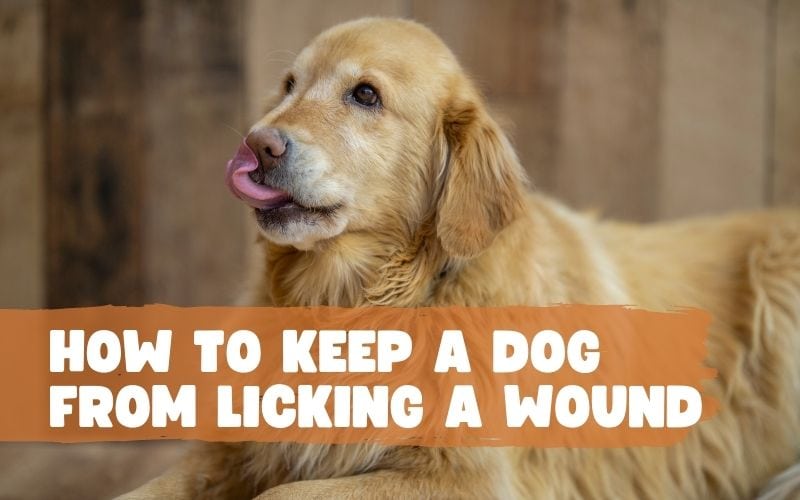It is in a dog’s nature to lick wounds or stitches because they bother them. A dog’s saliva contains antibacterial properties that can help in healing wounds and keeping bacteria at bay. This is vital for their survival in the wild and strays but it can harm them more than be helpful.
Although a little bit of licking may not be a problem, excessive licking after surgery can promote infection, delay healing, remove stitches, reopen the wound, and make applying gel or cream to the area difficult and ineffective. It can also destroy the tissues in and around the area.
As a pet owner, you must understand the seriousness of this tendency in dogs. If your dog is displaying this inclination, you should consider ways to stop your dog’s wound licking tendency. There are various methods to limit the dog’s ability to reach out and lick the wound to promote proper healing.
How to deal with your dog’s wound licking tendencies?
Veterinarians recommend using an E-collar (short for Elizabethan collar and not to be confused with the electronic kind) in certain situations to keep a dog from licking his wound. Most pet owners consider dog cones too inhumane to use.
Both collar and cone can be uncomfortable for the dog. Their presence, weight, and how they rub against your dog’s neck can cause additional problems. As a result, owners look for dog cone alternatives to stop dogs from licking wounds.
Here are some widely accepted techniques you can adopt to stop dogs licking wounds.
1. Cover the wound using a bandage
Applying a bandage to the wound will not only prevent your dog from accessing the wound but will also establish a healthy wound environment. This will help to heal the wound faster.
Wound healing, on the other hand, requires a free flow of oxygen. As a result, while it is critical to ensure that the bandage is securely fastened, make sure that it is not too tight that it restricts the free flow of air or your dog’s movement.
2. Apply an anti-lick solution to the wound
Some bandages have an anti-lick coating that is bitter and will discourage your dog from licking the area once he or she detects the taste. Spray versions of anti-lick solutions are also available so that you can spray to stop dog licking wounds.
You can also apply anti-lick strips directly to wounds and on top of dressings like a bandage. Sprays with anti-lick solution, on the other hand, should only be used on a wound that has been carefully covered so that no spray solution gets into an open wound.
3. Post-operative care suit for dogs
A post-operative care suit is one of the greatest ways to cover a dog’s wound, especially if it is on his body. These soft fabric suits are meant to cover your dog’s wound in a way that prevents obsessive licking and thereby speeds up the healing process. Instead of using a cone to restrict your dog’s head movement, you can cover his body to prevent him from licking.
4. Distract your dog
Distraction is an ideal tactic to prevent your dog from licking his wounds. Keep him occupied with food, physical activities, games, socializing, and going on walks. All these activities can act as distractions and help the dog forget and ignore the wound by focussing on the more attention-grabbing things going on around him.
5. Buy boots or socks to stop dog licking paw wounds
If you want to keep your dog from licking the wound on their paws, you should use boots created specifically for dogs. Of course, it is not possible to use the same tactics on any other area of the body but they’re extremely useful for limiting access to their paws.
Using shoes with bandages is an excellent idea, especially if the wound you’re trying to cover is still new or open. If you prefer to use a bandage underneath, choose shoes that are a size larger than your dog’s so that it doesn’t become too tight and cause discomfort to your dog.
6. Prevent the movement of the dog’s neck with neck brace
This is a wide strap around your dog’s neck that helps limit the movement of your dog’s neck. This will keep your dog’s neck from twisting and accessing any wounds. Your dog may find this strap uncomfortable. It can be irritating for the dog if they are too tight or forced to wear it for a long time.
7. Apply an itch reliever to the wound
Your dog will most likely lick the wound because it is itchy. Applying itching-relieving medications such as medicated shampoos, basic Benadryl, or, in severe situations, steroids can help curb the tendency. You can try home remedies for itching in dogs after consulting the veterinarian.
Conclusion
It’s vital to your dog’s health and healing that you prevent him from licking the wound. You can discourage your dog from licking the wound by using one of the strategies mentioned above. Whichever method you choose, keep a watch on the dog to see if it works. Ensure that your dog doesn’t find another way to lick the wound.
If your dog is licking the wound persistently, you should consult your veterinarian for more professional advice. Your vet will either prescribe medication to stop the behavior or recommend other innovative ways to keep your dog from licking his wound.
